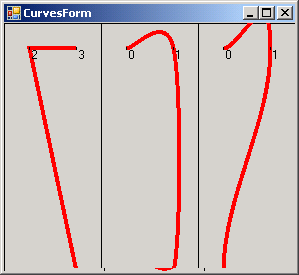Curve Demo

Imports System
Imports System.Collections
Imports System.ComponentModel
Imports System.Windows.Forms
Imports System.Data
Imports System.Configuration
Imports System.Resources
Imports System.Drawing
Imports System.Drawing.Drawing2D
Imports System.Drawing.Imaging
Imports System.Diagnostics
Public Class MainClass
Shared Sub Main()
Dim myform As Form = New CurvesForm()
Application.Run(myform)
End Sub
End Class
Public Class CurvesForm
Inherits System.Windows.Forms.Form
#Region " Windows Form Designer generated code "
Public Sub New()
MyBase.New()
'This call is required by the Windows Form Designer.
InitializeComponent()
'Add any initialization after the InitializeComponent() call
End Sub
'Form overrides dispose to clean up the component list.
Protected Overloads Overrides Sub Dispose(ByVal disposing As Boolean)
If disposing Then
If Not (components Is Nothing) Then
components.Dispose()
End If
End If
MyBase.Dispose(disposing)
End Sub
'Required by the Windows Form Designer
Private components As System.ComponentModel.IContainer
'NOTE: The following procedure is required by the Windows Form Designer
'It can be modified using the Windows Form Designer.
'Do not modify it using the code editor.
<System.Diagnostics.DebuggerStepThrough()> Private Sub InitializeComponent()
components = New System.ComponentModel.Container()
Me.Text = "CurvesForm"
End Sub
#End Region
Private Sub CurvesForm_Paint(ByVal sender As Object, ByVal e As PaintEventArgs) Handles MyBase.Paint
Dim g As Graphics = e.Graphics
Dim x As Integer = 0
Dim y As Integer = 0
Dim width As Integer = Me.ClientRectangle.Width / 3
Dim height As Integer = Me.ClientRectangle.Height
Dim blackBrush As Brush = Brushes.Black
Dim fillBrush As Brush = Brushes.Gray
Dim whitePen As Pen = Pens.White
Dim format As StringFormat = New StringFormat()
format.Alignment = StringAlignment.Center
format.LineAlignment = StringAlignment.Center
Dim pen As Pen = New Pen(Color.Red, 4)
Dim pointPen As Pen = New Pen(Color.Black, 3)
pointPen.StartCap = pointPen.EndCap = LineCap.SquareAnchor
Dim tension As Single = 0
Dim points As PointF() = New PointF() {New PointF(x + 25, y + height - 25), New PointF(x + width - 25, y + height - 25), New PointF(x + 25, y + 25), New PointF(x + width - 25, y + 25)}
g.DrawRectangle(Pens.Black, x, y, width, height)
g.DrawCurve(pen, points, tension)
Dim point As PointF
For Each point In points
g.DrawLine(pointPen, New Point(point.X, point.Y), New Point(point.X + 1, point.Y))
Next
Dim i As Integer
For i = 0 To points.Length - 1
g.DrawString(i.ToString(), Me.Font, blackBrush, points(i))
Next
x = IIf(x > Me.ClientRectangle.Width - 2 * width, 0, x + width)
y = IIf(x = 0, y + height, y)
tension = 0.5
points = New PointF() {New PointF(x + 25, y + 25), New PointF(x + width - 25, y + 25), New PointF(x + width - 25, y + height - 25), New PointF(x + 25, y + height - 25)}
g.DrawRectangle(Pens.Black, x, y, width, height)
g.DrawCurve(pen, points, tension)
For Each point In points
g.DrawLine(pointPen, New Point(point.X, point.Y), New Point(point.X + 1, point.Y))
Next
For i = 0 To points.Length - 1
g.DrawString(i.ToString(), Me.Font, blackBrush, points(i))
Next
x = IIf(x > Me.ClientRectangle.Width - 2 * width, 0, x + width)
y = IIf(x = 0, y + height, y)
tension = 1.0
points = New PointF() {New PointF(x + 25, y + 25), New PointF(x + width - 25, y + 25), New PointF(x + 25, y + height - 25), New PointF(x + width - 25, y + height - 25)}
g.DrawRectangle(Pens.Black, x, y, width, height)
g.DrawCurve(pen, points, tension)
For Each point In points
g.DrawLine(pointPen, New Point(point.X, point.Y), New Point(point.X + 1, point.Y))
Next
For i = 0 To points.Length - 1
g.DrawString(i.ToString(), Me.Font, blackBrush, points(i))
Next
x = IIf(x > Me.ClientRectangle.Width - 2 * width, 0, x + width)
y = IIf(x = 0, y + height, y)
End Sub
End Class
Related examples in the same category